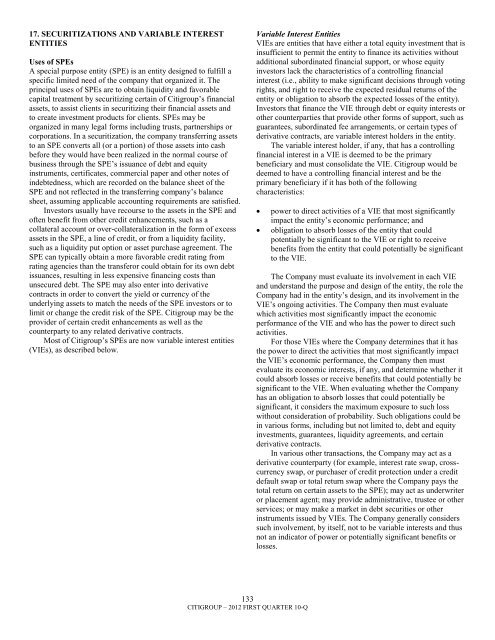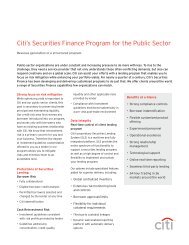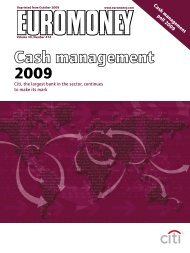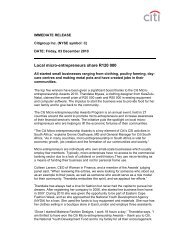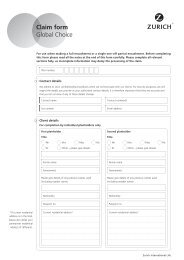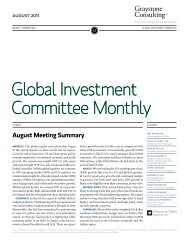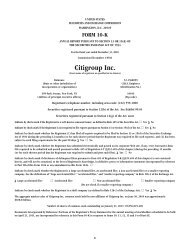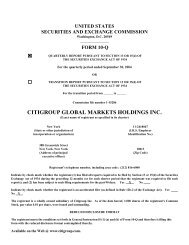7.3 billion - Citigroup
7.3 billion - Citigroup
7.3 billion - Citigroup
You also want an ePaper? Increase the reach of your titles
YUMPU automatically turns print PDFs into web optimized ePapers that Google loves.
17. SECURITIZATIONS AND VARIABLE INTERESTENTITIESUses of SPEsA special purpose entity (SPE) is an entity designed to fulfill aspecific limited need of the company that organized it. Theprincipal uses of SPEs are to obtain liquidity and favorablecapital treatment by securitizing certain of <strong>Citigroup</strong>‘s financialassets, to assist clients in securitizing their financial assets andto create investment products for clients. SPEs may beorganized in many legal forms including trusts, partnerships orcorporations. In a securitization, the company transferring assetsto an SPE converts all (or a portion) of those assets into cashbefore they would have been realized in the normal course ofbusiness through the SPE‘s issuance of debt and equityinstruments, certificates, commercial paper and other notes ofindebtedness, which are recorded on the balance sheet of theSPE and not reflected in the transferring company‘s balancesheet, assuming applicable accounting requirements are satisfied.Investors usually have recourse to the assets in the SPE andoften benefit from other credit enhancements, such as acollateral account or over-collateralization in the form of excessassets in the SPE, a line of credit, or from a liquidity facility,such as a liquidity put option or asset purchase agreement. TheSPE can typically obtain a more favorable credit rating fromrating agencies than the transferor could obtain for its own debtissuances, resulting in less expensive financing costs thanunsecured debt. The SPE may also enter into derivativecontracts in order to convert the yield or currency of theunderlying assets to match the needs of the SPE investors or tolimit or change the credit risk of the SPE. <strong>Citigroup</strong> may be theprovider of certain credit enhancements as well as thecounterparty to any related derivative contracts.Most of <strong>Citigroup</strong>‘s SPEs are now variable interest entities(VIEs), as described below.Variable Interest EntitiesVIEs are entities that have either a total equity investment that isinsufficient to permit the entity to finance its activities withoutadditional subordinated financial support, or whose equityinvestors lack the characteristics of a controlling financialinterest (i.e., ability to make significant decisions through votingrights, and right to receive the expected residual returns of theentity or obligation to absorb the expected losses of the entity).Investors that finance the VIE through debt or equity interests orother counterparties that provide other forms of support, such asguarantees, subordinated fee arrangements, or certain types ofderivative contracts, are variable interest holders in the entity.The variable interest holder, if any, that has a controllingfinancial interest in a VIE is deemed to be the primarybeneficiary and must consolidate the VIE. <strong>Citigroup</strong> would bedeemed to have a controlling financial interest and be theprimary beneficiary if it has both of the followingcharacteristics:power to direct activities of a VIE that most significantlyimpact the entity‘s economic performance; andobligation to absorb losses of the entity that couldpotentially be significant to the VIE or right to receivebenefits from the entity that could potentially be significantto the VIE.The Company must evaluate its involvement in each VIEand understand the purpose and design of the entity, the role theCompany had in the entity‘s design, and its involvement in theVIE‘s ongoing activities. The Company then must evaluatewhich activities most significantly impact the economicperformance of the VIE and who has the power to direct suchactivities.For those VIEs where the Company determines that it hasthe power to direct the activities that most significantly impactthe VIE‘s economic performance, the Company then mustevaluate its economic interests, if any, and determine whether itcould absorb losses or receive benefits that could potentially besignificant to the VIE. When evaluating whether the Companyhas an obligation to absorb losses that could potentially besignificant, it considers the maximum exposure to such losswithout consideration of probability. Such obligations could bein various forms, including but not limited to, debt and equityinvestments, guarantees, liquidity agreements, and certainderivative contracts.In various other transactions, the Company may act as aderivative counterparty (for example, interest rate swap, crosscurrencyswap, or purchaser of credit protection under a creditdefault swap or total return swap where the Company pays thetotal return on certain assets to the SPE); may act as underwriteror placement agent; may provide administrative, trustee or otherservices; or may make a market in debt securities or otherinstruments issued by VIEs. The Company generally considerssuch involvement, by itself, not to be variable interests and thusnot an indicator of power or potentially significant benefits orlosses.133CITIGROUP – 2012 FIRST QUARTER 10-Q


